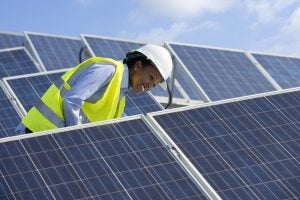 When the Illinois General Assembly met last week, lawmakers addressed the COVID-19 crisis among other priorities. This is, above all, a public health crisis and a human tragedy. More than 100,000 people in the state have been infected with this virus, and heartbreakingly more than 4,000 Illinoisans have lost their lives to it. We salute all of those working to combat this insidious virus.
When the Illinois General Assembly met last week, lawmakers addressed the COVID-19 crisis among other priorities. This is, above all, a public health crisis and a human tragedy. More than 100,000 people in the state have been infected with this virus, and heartbreakingly more than 4,000 Illinoisans have lost their lives to it. We salute all of those working to combat this insidious virus.
Of course, the crisis also extends to our economy. Unemployment numbers rival those of the Great Depression. Businesses are fighting to stay afloat. Households face tough choices to afford essentials like rent, utilities and groceries.
A plan to stimulate the economy is urgently needed. Yet, the approach we take will have lasting implications. State leaders need to act quickly — but with an eye toward the years and decades ahead.
If we are serious about promoting economic activity, creating jobs and helping protect consumers’ pocketbooks, for both the near- and long-term, Illinois would be wise to invest in the clean energy economy. Fueled by the Future Energy Jobs Act of 2016, clean energy represented one of the fastest growing job producers prior to the COVID-19 outbreak. More than 100,000 Illinoisans were employed in this sector. In the area of solar energy, jobs grew by a robust 13% in 2019, while overall job growth in Illinois was just 1.1%.
Clean energy bill is key to reinvigorating Illinois’ post-COVID economy Share on XFortunately, a plan for reinvigorating Illinois’ economy through clean energy already exists — a blueprint for building jobs, sustaining businesses and even encouraging new businesses to open their doors. That is the Clean Energy Jobs Act (HB3624/SB2132), legislation co-sponsored by more than 50 House members and by a majority of the Senate.
There is strong public support for swift action on CEJA. As a recent poll of 600 Illinois residents showed, an astounding 82% of Illinoisans are in favor of the legislation, with support cutting across party and regional lines. The bill is supported by 98% of Democrats, 58% of Republicans and 84% of Independents. More than three-quarters of people (76%) in Southern Illinois favor passage of the bill. The poll shows that Illinoisans want the legislation approved without delay; almost three-quarters of people (74%) say that the General Assembly should pass CEJA this year.
Unfortunately, lawmakers chose not to call up CEJA during its recent special session. When they reconvene next, whether for the fall veto session or earlier, we urge legislators to give CEJA the attention it deserves. Above all, they should consider CEJA as part of the framework to rebuild Illinois’ economy.
CEJA would have an enormous impact on the job market at a time we need it most. Workforce investments will be targeted at areas like installation, operations, maintenance, sales, marketing, engineering and other core careers in the clean energy economy. These investments would be equitably distributed throughout the state, with a special focus on communities impacted by pending coal plant closings. Through innovations such as Clean Energy Workforce Hubs and incubators to develop clean energy businesses, CEJA will give Illinoisans the chance to participate in the clean energy economy as workers and as entrepreneurs.
The legislation would create much-needed fiscal benefits, as CEJA will generate billions of dollars in state and local tax revenue. This money will be of tremendous value to municipalities struggling — even in good economic times — to pay for schools or first-responders, infrastructure, or growing pension obligations. In a COVID-era economy, these revenues are desperately needed by local governments.
CEJA will also serve as a bulwark against a recent decision by federal regulators that will force Illinois consumers to pay hundreds of millions of dollars more per year on their electricity bills, most of it going to prop up dirty power sources. By reforming the so-called capacity market and enabling Illinois to conduct its own auctions to procure energy, CEJA puts money back in the pockets of consumers at a time when every dollar matters.
It is important to note that funding for CEJA relies not on increasingly over-burdened taxpayer dollars, but instead by leveraging private investment.
To his credit, Gov. Pritzker has endorsed the goal of working on energy legislation in 2020. We urge lawmakers to join the governor and act quickly to ensure that — once the threat of the virus subsides — Illinois emerges quickly from this pressing economic challenge and is poised for growth in the years ahead.









